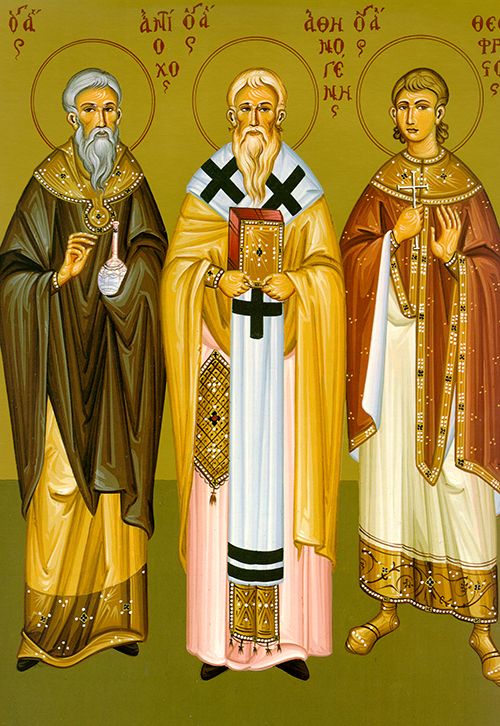

The holy martyr Athenogenes was the bishop of Sebaste in Cappadocia. Christianity was spreading in Sebaste because of the grace-filled preaching of Bishop Athenogenes. When the governor heard that the citizens of Sebaste refused to participate in a festival for idols, he sent soldiers to arrest St. Athenogenes and his disciples. While in prison, St. Athenogenes encouraged his spiritual children for their impending struggle. Led forth to trial, all the holy martyrs confessed themselves Christians and refused to offer sacrifice to idols. After undergoing fierce tortures, the disciples of the holy bishop were beheaded. After the execution of the disciples, the executioners were ordered to torture the bishop. Strengthened by the Lord, Saint Athenogenes underwent the tortures with dignity. His only request was that he be executed in the monastery. Taken to his own monastery, the saint gave thanks to God, and he rejoiced in the sufferings that he had undergone for Him. St. Athenogenes asked that the Lord would forgive the sins of all those who would remember both him and his disciples. The Lord granted the saint to hear His Voice before death, announcing the promise given to the penitent thief: “Today you shall be with Me in Paradise.” The hieromartyr willingly bent his neck beneath the sword.
The holy Athenogenes offered his ten disciples like a sacrifice to the Lord. The shepherd and his sheep entered the heavenly fold. By their work they vanquished the lies of the pagans. O Christ our God, save your flock from the wolves by the prayer of your martyrs.
You heeded the word of the Master and laid down your life for your sheep like a good shepherd. Therefore we bless you, O priest-martyr Athenogenes, and we praise your ten disciples who were guided by fear of God and by your teachings. The Master has crowned you as a friend and set you at his right side in glory. Now pray to Him for all of us.
1 Corinthians 12: 12-26
Brothers and sisters: The body is one and has many members, but all the members, many though they are, are one body; and so it is with Christ. It was in one Spirit that all of us, whether Jew or Greek, slave or free, were baptized into one body. All of us have been given to drink of the one Spirit. Now the body is not one member, it is many. If the foot should say, “Because I am not the hand I do not belong to the body,” would it then no longer belong to the body? If the ear should say, “Because I am not an eye I do not belong to the body,” would it no longer belong to the body? If the body were all eye, what would happen to our hearing? If it were all ear, what would happen to our smelling? As it is, God has set each member of the body in the place he wanted it to be. If all the members were alike, where would the body be? There are, indeed, many different members, but one body. The eye cannot say to the hand, “I do not need you,” any more than the head can say to the feet, “I do not need you.” Even those members of the body which seem less important are in fact indispensable. We honor the members we consider less honorable by clothing them with greater care, thus bestowing on the less presentable a propriety which the more presentable already have. God has so constructed the body as to give greater honor to the lowly members, that there be no dissension in the body, but that all the members may be concerned for one another. If one member suffers, all the members suffer with it; if one member is honored, all the members share its joy.
Matthew 18: 18-22; 19:1-2, 13-15
The Lord said to his disciples: “I assure you, whatever you declare bound on earth shall be held bound in heaven, and whatever you declare loosed on earth shall be held loose in heaven. Again I tell you, if two of you join your voices on earth to pray for anything whatever, it shall be granted you by my Father in heaven. Where two or three are gathered in my name, there am I in their midst.”
Then Peter came up and asked him, “Lord, when my brother wrongs me, how often must I forgive him? Seven times?” “No,” Jesus replied, “not seven times; I say, seventy times seven times.”
When Jesus had finished this discourse, he left Galilee and came to the district of Judea across the Jordan. Great crowds followed him and he cured them there.
At one point, children were brought to him so that he could place his hands on them in prayer. The disciples began to scold them, but Jesus said, “Let the children come to me. Do not hinder them. The kingdom of God belongs to such as these.” And he laid his hands on their heads before he left that place.
Icon courtesy of Jack Figel, Eastern Christian Publications – ecpubs.com
Monday, July 15 –